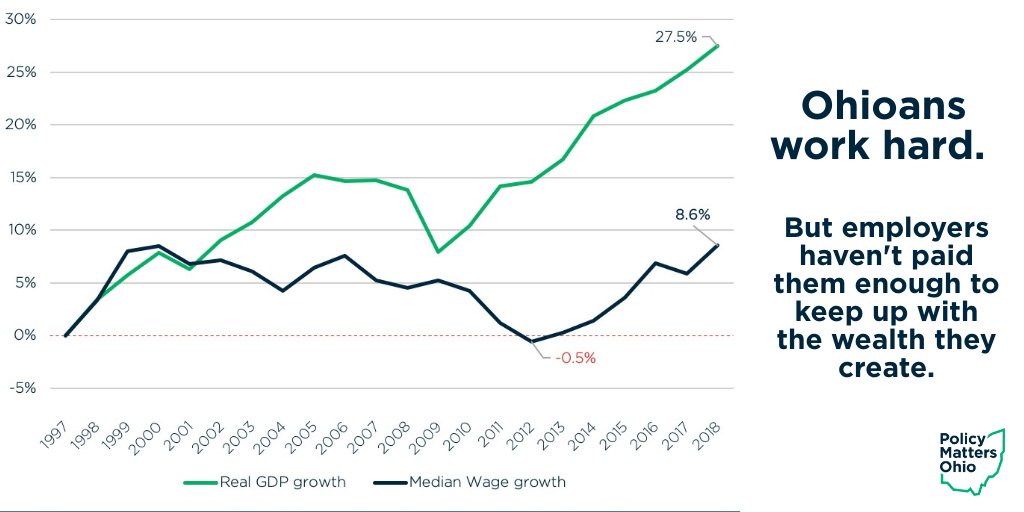Thread 🚨
Yesterday the #Census released new data that show how Americans fared last year w/ a caveat: the pandemic ended doorknocking early and caused a pretty big undercount.
But this is clear: too many Americans struggled to make ends meet in 2019.
1/
policymattersohio.org/blog/2020/09/1…
Yesterday the #Census released new data that show how Americans fared last year w/ a caveat: the pandemic ended doorknocking early and caused a pretty big undercount.
But this is clear: too many Americans struggled to make ends meet in 2019.
1/
policymattersohio.org/blog/2020/09/1…
Everyone should be able to put food on the table and keep the lights on - even during tough times. But when the health crisis hit, and necessary public health orders caused many people to lose their jobs, a lot of people didn't have reserves needed.
2/
2/
People are suffering because of decisions made by some of our elected leaders who are more accountable to what's best for corporations instead of what's best for people.
3/
3/
For years, certain policymakers have chosen to hold down wages, allow employers to steal workers' pay and attack working peoples' right to join together in unions. That's translated into too much of the wealth working people create being hoarded by those at the very top.
4/
4/

At the same time, they've cut taxes for the very wealthy and corporations. That's mean fewer public resources to support the essential services that help people make it through tough times.
5/
5/
So right now, the most important thing is for our federal leaders to come together and pass COVID aid - no more gridlock, no more half measures.
6/
policymattersohio.org/press-room/202…
6/
policymattersohio.org/press-room/202…
So here's some of the data: Median household income was reported at $68,703. After adjusting for nonresponse bias, the Census Bureau estimates that real median household income in 2019 was 2.8 percent lower at $66,790. Both represent improvements over 2018.
7/
7/
The poverty rate was reported at 10.5%, but the Census Bureau’s correction estimates it to be 11.1%: an undercount of 2 million Americans.
The 2018 rate of 11.8% was the first year the poverty rate was reduced to pre-Great Recession level.
8/
The 2018 rate of 11.8% was the first year the poverty rate was reduced to pre-Great Recession level.
8/
One Census survey found the number of Americans lacking health coverage decreased by 1.4 million last year.
Another measure reported an increase of 1.1 million.
Estimates of the number of uninsured Americans ranged from 26.1 million to 29.6 million.
9/
Another measure reported an increase of 1.1 million.
Estimates of the number of uninsured Americans ranged from 26.1 million to 29.6 million.
9/
Across the U.S., earnings for people working full-time reportedly grew by 1.4% over 2018 to $41,537 in 2019 -- slower than the previous year's rate of 3.4%, accounting for inflation.
10/
10/
The overall poverty rate for women fell to 11.5% from 12.9% in 2018.
However, employers paid women 82 cents for each $1 they pay men, unchanged since 2018.
11/
However, employers paid women 82 cents for each $1 they pay men, unchanged since 2018.
11/
Income rose for Americans of all races since 2018.
- Household earnings for Black ppl ⬆︎ 7.9%
- Hispanic Americans ⬆︎ 7.1%
- Asian Americans ⬆︎ 10.6%
- White non-Hispanic Americans ⬆︎ 5.7%
12/
- Household earnings for Black ppl ⬆︎ 7.9%
- Hispanic Americans ⬆︎ 7.1%
- Asian Americans ⬆︎ 10.6%
- White non-Hispanic Americans ⬆︎ 5.7%
12/
Poverty rates for people in female-headed families fell to the lowest rate on record for the group (24.3%), lifting 565,000 children out of poverty since 2018.
13/
13/
Despite record lows, poverty rates remained unacceptably high for people in households headed by Black (28.7%) and Hispanic (31.1%) women.
And 34 million Americans still live in poverty, including 10.5 million children.
14/
And 34 million Americans still live in poverty, including 10.5 million children.
14/
Deep barriers to good jobs, homeownership & unequal funding of public schools (to name a few) drive more Black & Latinx ppl into poverty.
Last year, 18.8% of Black ppl & 15.7% of Hispanic Americans (15.7%) lived in poverty compared to 7.3% of white ppl
15/
Last year, 18.8% of Black ppl & 15.7% of Hispanic Americans (15.7%) lived in poverty compared to 7.3% of white ppl
15/
Other #Census data called the Household Pulse Survey provides a real-time snapshot of what conditions are like now. We included that in the blog, too. The survey asked adults about their households between 8/19-8/31. These data show a lot of people are having tough times.
16/
16/
- 56.1% of ppl had at least some difficulty covering usual household expenditures.
- Black and Latinx residents were much more likely to report difficulty.
- An estimated 14.1% of adults in households with children said they sometimes didn't have enough to eat
17/
- Black and Latinx residents were much more likely to report difficulty.
- An estimated 14.1% of adults in households with children said they sometimes didn't have enough to eat
17/
The data shows that the choices our policymakers have made haven't served millions of Americans. Now, in the biggest crisis of our generation - it's up to all of us to push them to chose differently.
18/18
18/18
• • •
Missing some Tweet in this thread? You can try to
force a refresh





